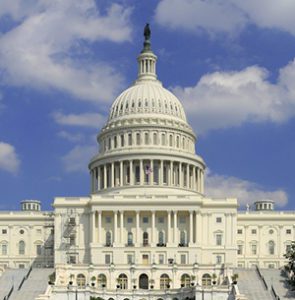 Following approval by the U.S. House last week, the U.S. Senate passed the 21st Century Cures Act (#CuresNow) in a bipartisan vote of 94-5 today. The $6 billion public health and medical research bill, which will now head to President Obama, is an umbrella for a variety of health initiatives, from authorizing money to combat the nation’s opioid crisis to funding the “moonshot” project to cure cancer.
Following approval by the U.S. House last week, the U.S. Senate passed the 21st Century Cures Act (#CuresNow) in a bipartisan vote of 94-5 today. The $6 billion public health and medical research bill, which will now head to President Obama, is an umbrella for a variety of health initiatives, from authorizing money to combat the nation’s opioid crisis to funding the “moonshot” project to cure cancer.
Included in the omnibus bill’s range of initiatives are several criminal justice reform measures related to the issue of mental health, including the enactment of the Comprehensive Justice and Mental Health Act (CJMHA) and the reauthorization of the Mentally Ill Offender Treatment and Crime Reduction Act (MIOTCRA). The bill is a milestone in the fight to address mental illness and substance use disorders in the criminal justice system. Many local governments are already making progress, with hundreds of counties across the nation joining the Stepping Up initiative and committing to reduce the number of people with mental illnesses in jails.
“It’s been encouraging to see Republicans and Democrats working to find common ground on the issue of criminal justice. Today, Congress backed up those efforts with action,” said Michael Thompson, director of The Council of State Governments Justice Center. “There’s a clear consensus on what types of tools our law enforcement officers, corrections staff, and behavioral health professionals need to advance both recovery and recidivism-reduction goals for people who are dealing with mental illnesses and addiction in jails and prisons. This bill provides much-needed resources and know-how to help state and local governments increase public safety, cut costs, and save lives.”
Here are five key impacts of the bill:
1. #CuresNow reauthorizes essential #MIOTCRA funds for mental health responses in corrections, courts, and by first responders.
Through its incorporation of CJMHA, the bill includes reauthorization of MIOTCRA, an essential funding mechanism for mental health resources within or intersecting with the justice system. The bill extends MIOTCRA for four years at $50 million per year, updates the legislation to provide new commitments to training first responders on responses to people with mental illnesses, and gives additional resources for veterans’ courts to help those with behavioral or post-traumatic stress disorders.
2. #CuresNow expands successful federal, state, and local models of #mentalhealth diversion.
Until now, local- or state-level programs of mental health and drug courts have not been adopted widely, in part because the grant rules impose limitations on which programs can be accessed by people with substance use disorders, mental illnesses, or co-occurring disorders.
The bill makes major amendments to existing programs—MIOTCRA, the federal Drug Court Grant Program, the Residential Substance Abuse Treatment grant program, and Prosecution Drug Treatment Alternatives to Incarceration Program—to allow state and local governments to expand targeted treatment interventions and court diversions for people who have co-occurring mental health and substance use disorders, and to provide high-intensity, community-based services for people in the criminal justice system who have mental illnesses.
The bill requires the attorney general and the director of the Administrative Office of United States Courts to create a Drug and Mental Health Court pilot program in at least one federal judicial district, where people with substance use or mental health needs convicted of low-level offenses would be eligible for diversion from prison if they comply with a court-ordered treatment program, following the model used in many state and local jurisdictions.
3. #CuresNow advances #mentalhealth as a key part of #reentry.
The bill brings new or expanded behavioral health resources into the package of reentry services provided to the millions of people that are released from prison or jail each year.
“Cures” authorizes funding for prison- and jail-based programs—including reentry programs—that aim to reduce the likelihood of recidivism when a person with a mental illness is released. In addition, through the Mental Health and Safe Communities provisions, the bill amends the Second Chance Act to allow state and local governments to use federal funds for mental health treatment and transitional services, such as housing assistance, for people returning to their communities after prison or jail.
4. #CuresNow expands training in effective #mentalhealth responses for #lawenforcement and #police officers.
Some police departments have trained officers in effective responses to people with mental illnesses, but many others struggle to afford the training.
The bill’s CJMHA provisions amend several key grants to allow law enforcement to use those funds to create specialized police response programs, such as crisis intervention teams, which notably loosens restrictions in the Byrne Justice Assistance Grants and Community Oriented Policing Services Grant Program (COPS) grants. New provisions also allow specialized training for first responders and paramedics responding to mental health emergencies, including on crisis de-escalation training. And each cabinet-level secretary is required to ensure mental health crisis and response training for members of the Federal Uniformed Services. Lastly, the bill requires the U.S. attorney general to create programs for federal first responders and tactical units.
In addition to increasing training for law enforcement agencies, the bill also creates the National Criminal Justice and Mental Health Training Center under the U.S. attorney general to identify best practices and provide technical assistance to government agencies implementing these practices.
5. #CuresNow prioritizes data collection, accountability, and policies, programs, and practices proven to work in #mentalhealth and #criminaljustice.
While the launch of the national training center created by the bill would help promote and train practitioners on evidence-based solutions, “Cures” also frees up money to help quantify the demand for frontline resources.
The CJMHA provisions included in the “Cures” bill provide ways for law enforcement, corrections, and mental health professionals to better respond to people with mental illnesses who are high utilizers of crisis response services.
To ensure that all grant resources are spent on policies and programs that are proven effective, the bill requires the U.S. Department of Justice (DOJ) to prioritize grant awards to applicants who use evidence-based interventions and risk assessment tools to help reduce recidivism.
Finally, the bill requires a new report by the U.S. Government Accountability Office on what practices federal first responders, tactical units, and corrections officers are trained to use, what procedures are used to appropriately respond to interactions with people with mental illnesses, the application of evidence-based practices in criminal justice settings, and recommendations on how DOJ can improve information-sharing and dissemination of best practices.
The CSG Justice Center Advisory Board establishes the policy and project priorities of the organization. The board features…
Read More Finding Solutions to Complex Criminal Justice Issues: Q&A with New CSG Justice Center Advisory Board Member Justice Briana Zamora
Finding Solutions to Complex Criminal Justice Issues: Q&A with New CSG Justice Center Advisory Board Member Justice Briana Zamora
The CSG Justice Center Advisory Board establishes the policy and project priorities…
Read More









